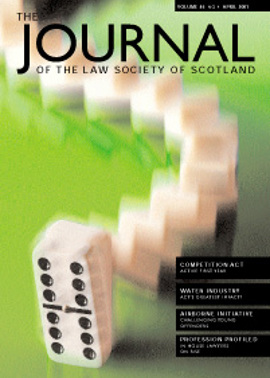Developing policy initiatives
Last summer the Policy and Planning Group (PPG) was formed to fulfil this role. Its members are: the President; the Vice President; the Past President (who is replaced by the Vice President Elect after December each year); the Chief Executive (Douglas Mill); two members of the Executive (currently Mary McGowan and Bruce Ritchie) and two elected members of Council (currently Gerry Brown and Joe Platt - who recently joined the Group following the retiral of John Newall, one of the founders of the group). The PPG acts as a greenhouse for ideas and formulates proposals for consideration by Council. It has been in existence for around nine months and it seems an appropriate time to review and report on its progress.
Formulating policy
Before the existence of the PPG it was recognised that a proper database of policies formulated by Council required to be established. It is now in place. The development of policy is obviously organic and the Policy Register will constantly change and can be sourced with the assistance of your Council Member or the Society Executive.The Society has been in existence for over fifty years and even in the last ten the duties and workload of Council members has significantly changed. The first very apparent need to be addressed was for a current working document to give assistance to aspiring or existing Council Members by explaining their duties, rights and responsibilities and which worked alongside the Solicitors (Scotland) Act 1980. The PPG developed the ‘Council Member’s Handbook’, which was adopted by Council. It is available on www.lawscot.org.uk, the Society’s website. It not only serves as a useful reference for members of Council but also ensures that every member of the profession has a clear statement of what they can expect from their Council representative as well as what is required of a Council member.
If the role of Council members was not committed to writing then the same was true of the roles of the President and the Chief Executive. The system worked but it was agreed that these roles should be clearly defined to ensure that the profession knew what was required from the holders of these two posts. Documents dealing with this were adopted by Council and again are available on the website.
The size and make-up of Council has remained relatively static and the PPG is currently assessing the size and constitution of Council as well as constituency sizes and demographics. Many feel that the size of Council inhibits policy development as part of the efficient running of Council’s affairs. The Constitution Committee has been charged with examining these issues and will shortly bring forward their proposals for consideration by the PPG. Thereafter the considered proposals and recommendations will go before Council.Relocation
Another area that the PPG has considered is the location of the Society’s offices. Is Drumsheugh Gardens best suited to give the members value for money and the efficient working of the Society that it deserves? I believe that our initial discussion at the PPG will lead to a fruitful examination of this issue. Any decisions on the issue should not be made in haste although the question at the forefront of people’s minds when considering this is simple:
Is Drumsheugh Gardens and Edinburgh the appropriate place for the Society’s ‘headquarters’ in 2010 and beyond?By its very nature, relocation is something that requires a great deal of thought and planning and the PPG is the ideal forum to develop the options. Council would, of course, be the final arbiter, but needs a smaller group - the PPG - to investigate the issues. It may be, of course, that the PPG recommends no change but at least Council can be confident that all the issues will have been canvassed and considered in full.
One of the most important areas of involvement for the PPG is Member Services. Solicitors deserve to get as much as possible from their membership of the Society, and Council has been able to develop services such as the Microsoft discount arrangement and the computer hardware deals. The way that these developed demonstrates how the PPG can work. James Ness, a Council member, made the contacts, negotiated proposed terms and then brought them to PPG which considered them and went to Council with a recommendation to go ahead with the deal, which was approved. It would have been much more difficult for Council to deal with matters so quickly if the PPG had not been involved. I hope that new deals will be announced in the near future.
Document exchange
The letters to the Journal and correspondence to the Society indicated that there was dissatisfaction with the operation of Hays DX. The PPG and the Office Bearers were able to bring the Legal Post proposals to Council when significant groundwork had been done against a background of commercial confidentiality and the necessity for speed. Many Council members were already well informed of their constituents’ concerns, which were acted upon.
The PPG has an important role to play both in provision of services to members and in developing ideas and projects for submission to Council.The best value from the PPG will only be achieved if proposals for consideration are generated by the members of the profession, either in person or through their representative Council member. I hope that members will bring forward many issues to the PPG who will be delighted to consider ideas whether they are in the form of a one-sentence statement or a paper on policy or planning proposals.
The PPG is a demonstration of the Society’s determination that its work should be focused not only on its statutory duties but also in providing the best service to members.





